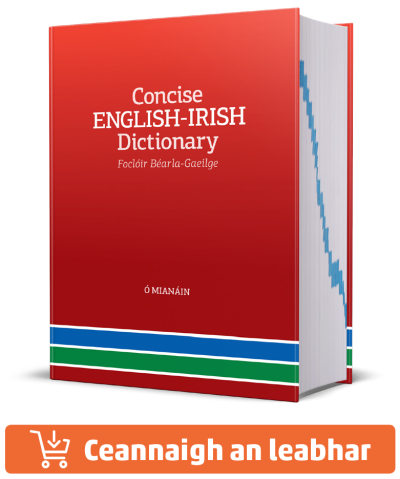Foclóir Gaeilge–Béarla
Ó Dónaill, 1977
An Foclóir Beag
Ó Dónaill & Ua Maoileoin, 1991
English–Irish Dictionary
de Bhaldraithe, 1959
Gramadach
Foghraíocht
híleáil
híleam
híleamorfach
híleamorfachas
Híleantóir
híleasóchas
hílim
himéiniach
himéiniam
himlic
hin
hine
hinigh
hinse
hiodra
hiodrainsia
hiodraisín
hiodráit
hiodráitigh
hiodráitiú
hiodrálach
hiodrálaic
Seans gur foirm é him de:
im »
CUARDACH DROIM AR AIS
IN FOCLÓIR GAEILGE—BÉARLA
ABAIRTÍ
IN FOCLÓIR GAEILGE—BÉARLA
Chomh ~ le him, soft as butter.
ABAIRTÍ
IN FOCLÓIR GAEILGE—BÉARLA
1) Bhí orm a chur, a cur, a gcur, ar scoil, I had to send him, her, them, to school.
Thug mé arán dó ach níor mhian leis a ithe, I gave him bread but he did not want to eat it.
Féadann tú a n-iarraidh air, you may ask him for them.
Agus a dhaoire a chosain siad dó, considering how dearly they cost him.
Bhí siad á moladh aige, they were being praised by him.
~ leis fanacht liom, tell him to wait for me.
Níl dada le rá leis ach an méid sin, there is nothing to be said to him, concerning him, but that.
~ aige, able for him, a match for him.
Chuaigh an buille ~ air, the blow took effect on him.
Thug sé ~ leis é, it is natural to him, he inherited it.
Tá ~ molta acu air, they have reason to praise him.
Tá ~ maíte acu as, they have reason to boast of him.
~ mise greim a fháil air, when I catch him.
Bhí sé sásta ~ an leithscéal sin a ghabháil leis, he was satisfied when that excuse was offered to him.
Lig fad an adhastair leis, give him plenty of rope.
Bainfidh mise ~ as, I’ll make him comply.
Is aige a fuair mé an speal, I got the scythe from him.
Tá sé ina fhear uasal acu, they look on him as a gentleman.
Fág an eochair aige, leave the key with him.
Tá grá, gráin, aici air, she loves, hates, him.
Tá gnó agam leis, I have business with him.
Bíodh aige! Let him be!
Bíodh an diabhal aige! Let him go to the devil!
B’éigean dom imeacht aige, I had to leave because of him.
Tá sé trom aige, it is heavy for him.
Bhí sé mór againn imeacht air, it was too much to expect that we should leave without him.
Tá sé in am aige pósadh, it is time for him to get married.
D’~ mé é fanacht sa bhaile, I pleaded with him, begged him, to stay at home.
Chonaic mé ag teacht é ~ cóta mór air, I saw him coming and he was wearing an overcoat.
Dá n-ólfadh, ~ an buidéal, ní dhéanfadh sé aon cheo air, if he did drink it, even the whole bottle, it would do him no harm.
Thug sé a oiread dó ~ a shásaigh é, he gave him enough to satisfy him.
D’aithin mé é chomh luath ~ a chonaic mé é, I recognized him as soon as I saw him.
Ó théann (sé) ~ go dtéann, ná cuir bac air, since he is going, which he is, don’t stop him.
Bíodh ~ go bhfaca tú é, granted that you saw him.
Is deacair ~ a bhaint as, it is hard to make him talk.
Chuir an bia ~ ann, the food cheered him.
Tá sé ar ~ agam labhairt leis, I intend to speak to him.
Labhair ina ~ leis, speak to him by name.
Is é a ~ é, (i) it is his name, (ii) it describes him perfectly.
~, d’~, gur labhair mé leis, although I spoke to him.
Thug siad ~ na hoíche dó, they entertained him for the night.
Ní bhfaigheadh an diabhal ~ air, he is always on the alert, the devil himself couldn’t take him at a disadvantage.
Ná tabhair ~ air, don’t heed him.
Ba é sin eagla na h~ dó, that was a very real fear with him.
Níl a fhios ag duine cad é atá in ~ dó, no man knows what is in store for him.
Níorbh ~ dó é, it was no trouble to him.
An ~ ar casadh orm é, as I happened to meet him.
Ní h~ dom é, I do not know him.
Tháinig sé in ~ dom, he came near enough for me to recognize him.
Aithním gur múinteoir, gur Éireannach, é, I know him for a teacher, an Irishman.
